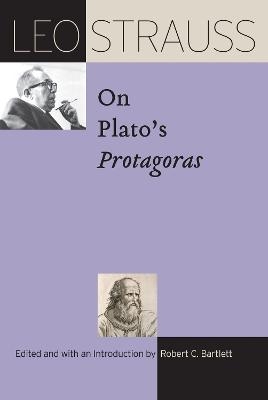
Leo Strauss on Plato’s "Protagoras"
University of Chicago Press (Verlag)
978-0-226-81815-3 (ISBN)
This book offers a transcript of Strauss’s seminar on Plato’s Protagoras taught at the University of Chicago in the spring quarter of 1965, edited and introduced by renowned scholar Robert C. Bartlett. These lectures have several important features. Unlike his published writings, they are less dense and more conversational. Additionally, while Strauss regarded himself as a Platonist and published some work on Plato, he published little on individual dialogues. In these lectures Strauss treats many of the great Platonic and Straussian themes: the difference between the Socratic political science or art and the Sophistic political science or art of Protagoras; the character and teachability of virtue, its relation to knowledge, and the relations among the virtues, courage, justice, moderation, and wisdom; the good and the pleasant; frankness and concealment; the role of myth; and the relation between freedom of thought and freedom of speech.
In these lectures, Strauss examines Protagoras and the sophists, providing a detailed discussion of Protagoras as it relates to Plato’s other dialogues and the work of modern thinkers. This book should be of special interest to students both of Plato and of Strauss.
Leo Strauss (1899–1973) was one of the preeminent political philosophers of the twentieth century. From 1949 to 1968 he was professor of political science at the University of Chicago. He is the author of many books, among them The Political Philosophy of Hobbes, Natural Right and History, and Spinoza’s Critique of Religion, all also published by the University of Chicago Press. Robert C. Bartlett is the Behrakis Professor of Hellenic Political Studies at Boston College. He is the author or editor of many books, including The Idea of Enlightenment and Sophistry and Political Philosophy, and he is cotranslator of Aristotle’s “Nicomachean Ethics.”
Note on the Leo Strauss Transcript Project
Editorial Headnote
Introduction
1 Sophistry and Rhetoric: Plato’s Gorgias Reconsidered
2 Callicles’s Challenge to Socrates in the Gorgias
3 Sophistry, Rhetoric, and the Philosophic Life
4 The Turn to the Protagoras (309a–312b)
5 Meeting Protagoras (312b–316c)
6 Is Virtue Teachable? (316c–320c)
7 The Long Speech of Protagoras: Mythos (320c–322d)
8 The Long Speech of Protagoras: Mythos and Logos (322d–325b)
9 The Long Speech of Protagoras, Teacher of Virtue (325b–329d)
10 The Cross-Examination of Protagoras: Virtue and Its Parts (329d–335c)
11 The First Breakdown of the Conversation and Its Aftermath (335c–341c)
12 Virtue in the Element of Poetry (341c–347c)
13 What Is Courage? (347c–352e)
14 On the Hedonism of the Many (352e–356c)
15 The Hedonistic Calculus and the Problem of Courage (356c–359c)
16 Courage, Hedonism, and the Refutation of Protagoras (359c–362a)
17 Summary and Conclusion: Rhetoric and Sophistry
Notes
Index
| Erscheinungsdatum | 26.04.2022 |
|---|---|
| Reihe/Serie | The Leo Strauss Transcript Series |
| Sprache | englisch |
| Maße | 152 x 229 mm |
| Gewicht | 767 g |
| Themenwelt | Geisteswissenschaften ► Philosophie ► Philosophie Altertum / Antike |
| ISBN-10 | 0-226-81815-2 / 0226818152 |
| ISBN-13 | 978-0-226-81815-3 / 9780226818153 |
| Zustand | Neuware |
| Haben Sie eine Frage zum Produkt? |
aus dem Bereich


